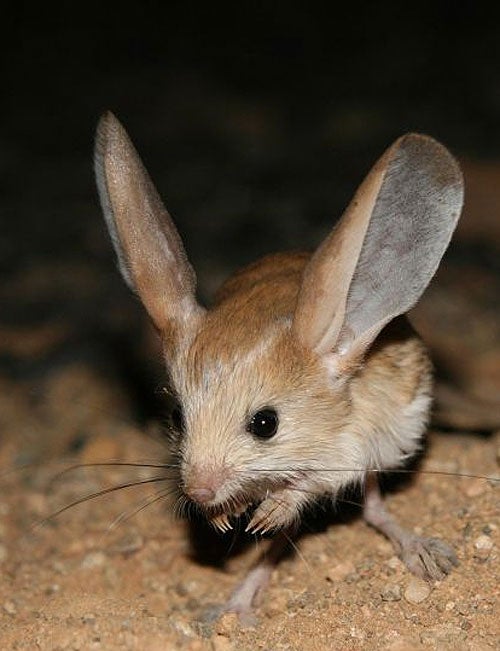Did you hear the one about the long-eared jerboa? It's been photographed for the first time

Your support helps us to tell the story
From reproductive rights to climate change to Big Tech, The Independent is on the ground when the story is developing. Whether it's investigating the financials of Elon Musk's pro-Trump PAC or producing our latest documentary, 'The A Word', which shines a light on the American women fighting for reproductive rights, we know how important it is to parse out the facts from the messaging.
At such a critical moment in US history, we need reporters on the ground. Your donation allows us to keep sending journalists to speak to both sides of the story.
The Independent is trusted by Americans across the entire political spectrum. And unlike many other quality news outlets, we choose not to lock Americans out of our reporting and analysis with paywalls. We believe quality journalism should be available to everyone, paid for by those who can afford it.
Your support makes all the difference.Images of the long-eared jerboa, a kangaroo-like rodent dubbed the Mickey Mouse of the desert for its enormous ears, have been captured for the first time in its natural habitat by a team from London Zoo.
Euchoreutes naso, easily identified by its disproportionately large ears, a third bigger than its head, has also evolved legs that allow it to jump like a kangaroo. It has been classified as endangered in the World Conservation Union's Red List.
Dr Jonathan Baillie, the head of field conservation at the Zoological Society of London (ZSL) and leader of its expedition to Mongolia, said his crew drove for days to get to the Gobi desert, then painstakingly scouted the area at night to find the rodents.
"The footage and images from this expedition really are extraordinary, and incredibly charming", Dr Baillie said. "The long-eared jerboa is a bit like the Mickey Mouse of the desert, cute and comic in equal measure.
"Its habitat is under threat from agriculture and illegal mining, which uses up vital water in the ecosystem", he said. "That affects all the species in the area, where water is already scarce. There are other jerboas, but the long-eared variety represents millions of years of independent evolutionary history, and it has no close relatives.
"When people see ZSL's footage of this tiny, threatened creature I am convinced they will want to get involved in its conservation. Unfortunately, it is just one of many amazing and unusual animals that are highly threatened but receiving little or no conservation attention".
The zoo is involved in a global project called Edge (Evolutionary distinct and globally endangered) which aims to study species that are both genetically unusual and in danger, such as the long-eared jerboa.
An in-country specialist has been appointed as Edge fellow by the zoo to study the long-eared jerboa's distribution and behaviour in depth. This scientist will investigate specific threats to the rodents' survival, which are believed to be down to human intervention.
So far, the fellow has identified the introduction of domestic cats, a predator the jerboas had not previously faced.
Little is known about the habits of the long-eared jerboa, which is found only in southern Mongolia and north-central regions of China. It is primarily nocturnal, spending most daylight hours in underground tunnels, and seems to subsist largely on insects.
Species classified as Edge have so few close relatives that they are highly genetically distinct; if they disappear there will be nothing left like them. The animals on this list are ranked according to their evolutionary rarity, as well as their proximity to extinction. The top ten Edge species also include theYangtze river dolphin (Lipotes vexillifer), the long-beaked echidna (Zaglossus bruijni) and the bumblebee bat (Craseonycteris thonglongyai).
To get involved in the debate, click here
Join our commenting forum
Join thought-provoking conversations, follow other Independent readers and see their replies
Comments